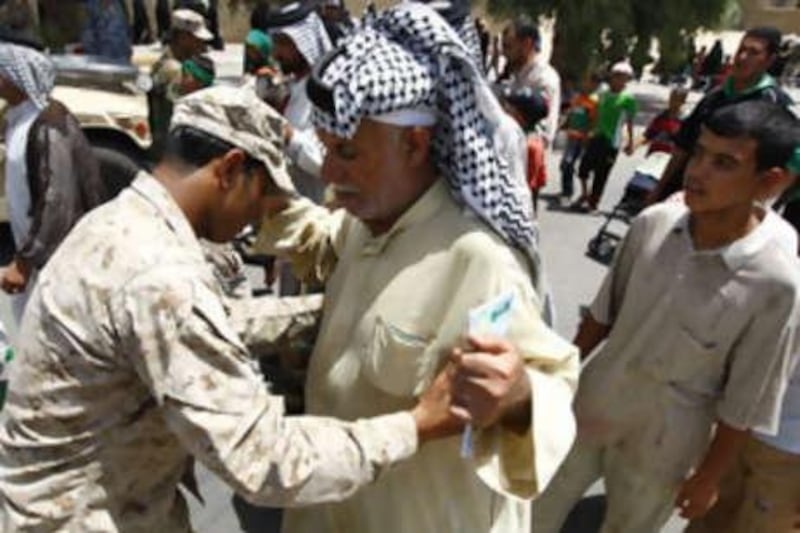BAGHDAD // The Iraqi capital was under a vehicle curfew for the peak of a Shiite pilgrimage today, while hundreds of thousands of Iraqi Shiites converged on a revered shrine in Baghdad, a day after three female suicide bombers killed at least 25 people among crowds of pilgrims.
More than 250 people were wounded in the four attacks, which marked one of the bloodiest days in Iraq this year. Violence has fallen to four-year lows, but the bombings underscore the challenge for the Iraqi prime minister, Nouri al Maliki, especially as US troops draw down while his forces seek to take on greater responsibility for safeguarding the country. Tens of thousands of Iraqi troops and police have deployed for the Shiite pilgrimage, setting up checkpoints and closing roads. The vehicle curfew took effect at dawn today.
Security forces have put female guards around Kadhamiya to search women, but all yesterday's blasts happened in central Baghdad, an area many pilgrims pass through to reach the shrine. Iraqi men are also reluctant to search women, prompting al Qa'eda to increasingly use females who easily hide explosives under their flowing black robes. The annual pilgrimage to the Kadhamiya shrine is one of the most important events in the Shiite religious calendar.
US commanders caution that despite better security, suicide bombers wearing vests packed with explosives will still manage to slip into crowded places. Women have carried out more than 20 suicide attacks in Iraq this year. The bombing in multi-ethnic Kirkuk occurred at a demonstration against a controversial provincial elections law, which has been widely criticised by minority Kurds. Last week, the Iraqi president, Jalal Talabani, rejected the law as unconstitutional after Kurdish lawmakers boycotted the parliament session that passed it.
The law would have postponed polls in Kirkuk and allocated equal seats to ethnic or sectarian groups, which Kurds rejected. The elections are expected later this year or early 2009. The fate of Kirkuk, a mixed city of Arabs, Kurds and Turkmen is one of the most divisive issues in Iraq. Minority Kurds, who run the largely autonomous northern Kurdistan region, see Kirkuk as their ancient capital and want a referendum to be held to decide who controls the city.
Arabs encouraged to move there under Saddam Hussein want the city to stay under central government control. Arabs and Turkmen believe Kurds have stacked Kirkuk with Kurds in an attempt to tip the demographic balance in their favour in any vote. *Reuters





